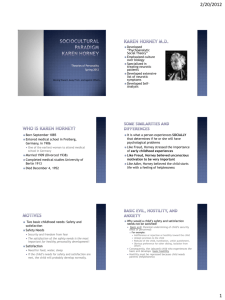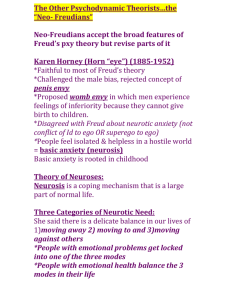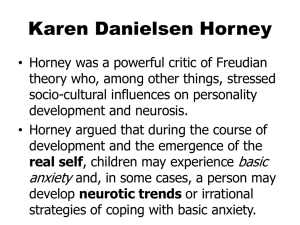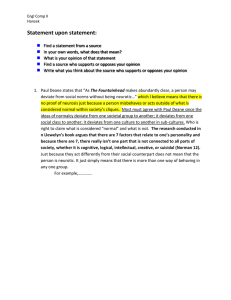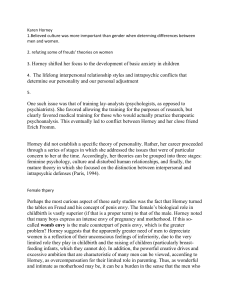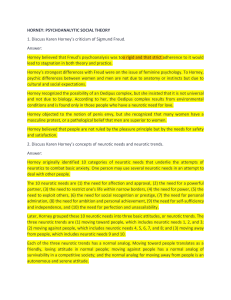Horney Notes
advertisement
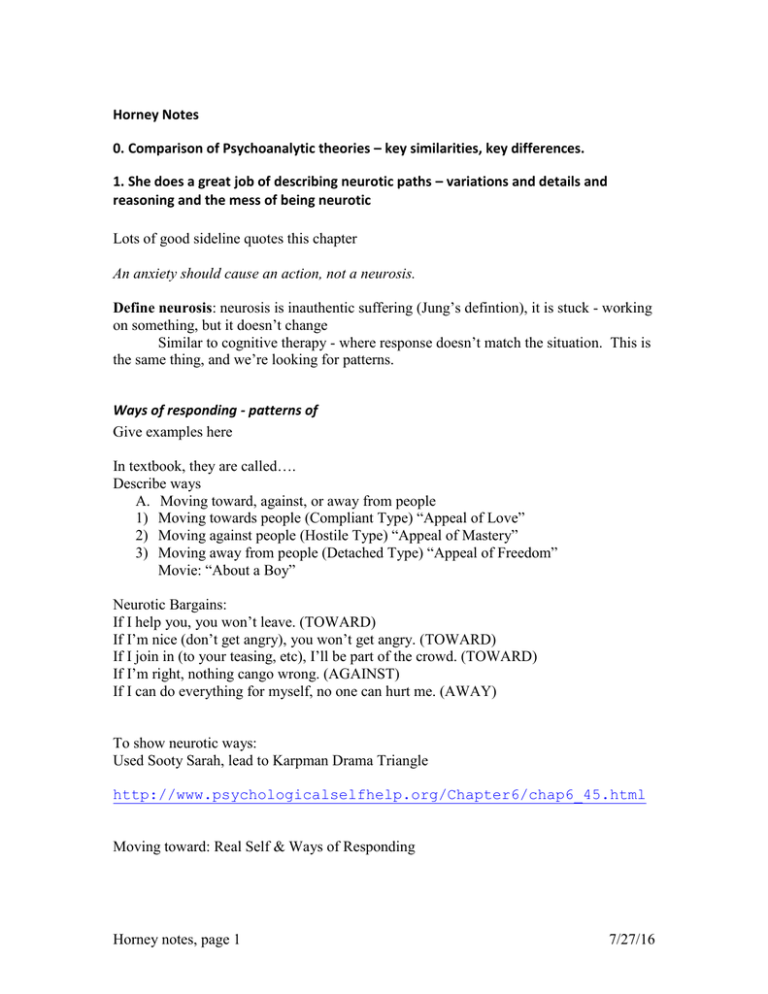
Horney Notes 0. Comparison of Psychoanalytic theories – key similarities, key differences. 1. She does a great job of describing neurotic paths – variations and details and reasoning and the mess of being neurotic Lots of good sideline quotes this chapter An anxiety should cause an action, not a neurosis. Define neurosis: neurosis is inauthentic suffering (Jung’s defintion), it is stuck - working on something, but it doesn’t change Similar to cognitive therapy - where response doesn’t match the situation. This is the same thing, and we’re looking for patterns. Ways of responding - patterns of Give examples here In textbook, they are called…. Describe ways A. Moving toward, against, or away from people 1) Moving towards people (Compliant Type) “Appeal of Love” 2) Moving against people (Hostile Type) “Appeal of Mastery” 3) Moving away from people (Detached Type) “Appeal of Freedom” Movie: “About a Boy” Neurotic Bargains: If I help you, you won’t leave. (TOWARD) If I’m nice (don’t get angry), you won’t get angry. (TOWARD) If I join in (to your teasing, etc), I’ll be part of the crowd. (TOWARD) If I’m right, nothing cango wrong. (AGAINST) If I can do everything for myself, no one can hurt me. (AWAY) To show neurotic ways: Used Sooty Sarah, lead to Karpman Drama Triangle http://www.psychologicalselfhelp.org/Chapter6/chap6_45.html Moving toward: Real Self & Ways of Responding Horney notes, page 1 7/27/16 Karen Horney had three different ways of responding. One: Moving toward people (Compliant type); in this response people who feel a great deal of worry and helplessness move toward people in order to seek help and acceptance. These people feel a strong need to be liked and appreciated. This can be bad because this type can become very clingy and needy and when and if in a relationship their partner may feel too overwhelmed and exit the relationship. (I have a problem with this). When moving toward people is brought to my mind I tend to think of myself a lot. Often a fear of helplessness and abandonment occurs in the category of compliance, and this relates to the basic anxiety of a problem. Moving toward people has been very problematic for me because I have moved towards someone and become so reliant on this one person to give me all the love and affection I never got from anyone else in my life (this is the bargain piece – and the neurotic- the making up for others in the past), and now this person has started to “abandon” me and I am left in a place I thought I was fixing or was trying to fix as the original coping method. Looking at the situation from afar, and taking a step back I can now see that this complete need to be loved and accepted has overwhelmed and exhausted my partner; and it can probably never be altered because of my neurotic behavior. Two: Moving against people 2. Real & ideal self Read page 17 of Neurosis and human growth (1st page of chatper 1) Real Self is… Growth, wants to realize one’s talents, potentials, and interests Self actualization Acts more clearly in the moment Feels more directly, but also more complexly - often multiple feelings relaxed and curious Ideal self Ideal self is created in those times of anxiety and need – the scared mind says “if I were this way, then I wouldn’t have been hurt or left alone.” Healthy looks like: b. In an ideal world, parents have come to terms with their own scarring. (Similar to Alice Miller --when we haven't healed our own stuff, we are not able to love kids as they are. If parents have done that, it creates a world where the child is safe, recognizes and trusts feelings, can make mistakes and learn for them, and be loved even when they blow it. Horney notes, page 2 7/27/16 Neither id nor the real self has knowledge of time, The Id is like the real self because it is raw desire, tailored specifically to the individual in which it resides The real self is the part of our identity that is relaxed and curious. The real self gets lost watching an aquarium in a doctor’s office, or exploring a new place. The real self is what we’re like under our neuroses, when we’re relaxed interested, energetic, and engaged. This is the part of ourselves that we experience when we let go and enjoy. The real self is also resilient and not really capable of being hurt. Beautifully said. Joe Lighton Ways to help them see Ideal Self and Real Self What creates it: Parents (society) can’t see child for themselves, vs. give them room for own feelings and “healthy friction with will and instincts of others” Ideal self is not good Ideal self: who I should be in order to get the love and protection I need - not exactly, that what it looks like, but not, Horney says, how it is experienced. If I attain the ideal self, then… What I need for myself Too cognitive People will love me I’ll never be hurt Introject: when we swallow whole pieces other people give us because we can’t digest them - hear mom’s voice, teacher’s voice These big whole balls of anxiety that… See example in file Tyranny of the shoulds Live up to teacher’s expectation Despised self: Inflation - Tyranny of shoulds – too big, then break apart Perfectionism… and the ideal self This ideal self, trying to compensate for weakness and guilt, sets up impossible demands, called neurotic needs. These needs are unconscious, intense, insatiable, anxiety-causing, and out of touch with reality. For instance, if one has a neurotic need for affection, it becomes urgent to be loved by everyone, all one's peers, all the family, teachers, the paper carrier, etc. Horney listed several neurotic needs, primarily needs for perfection, power, independence, and affection. All are attempts to handle the primitive hostility from childhood. So, how do we get depressed? Horney notes, page 3 7/27/16 Write down your ideal self… Read from Neurosis and Human Growth, page 65 main para in middle Example page 66 - the feeling even after knowing… Pull out things you could never be e.g. a different height, or younger How was this creature created by the outside world The chapter has 3 Phases: Freud and Women - quote - p. 123 Instead – emphasize Cultural role Not penis envy - privilege envy p. 124 - instincts are basically insatiable, destructive and anti-social, that’s a neurotic response to bad conditions Quotes on Psychology of Women [W]e should stop bothering about what is feminine…. Standards of masculinity and femininity are artificial standards…. Differences between the two sexes certainly exist, but we shall never be able to discover what they are until we have first developed our potentialities as human beings. Paradoxical as it may sound, we shall find out about these differences only if we forget about them. Horney, 1935, in Paris, in Frager and Fadiman, 1994, p. 238 She is responding to ideas like this: (gives us some historical context) She is said to be at home only in the realm of eros. Spiritual matters are alien to her innermost being, and she is at odds with cultural trends... She therefore is…a second-rate being…. [She is] prevented from real accomplishment by the deplorable, bloody tragedies of menstruation and childbirth. And so every man silently thanks his God, just as the pious Jew does in his prayers, that he was not created a woman. Horney, 1967, p. 114 Horney notes, page 4 7/27/16 Humanistic and growth psychology Ideal and real self, pride system Horney notes, page 5 7/27/16 What creates neurosis Basic Hostility 3 pieces – not explained well parents – more or less hostility for child to deal with. Include in list: parents focused on own needs Lacking in warmth Aware of own weakness -> despised self concept Basic Anxiety - not loved, accepted - response - some left over Jo’s notes Basic Conflict and pride system - not in Jo’s notes interesting Horney notes, page 6 7/27/16 3 Ways of reacting rigidity = ill health more detail in separate file Ways of Responding In textbook, they are called…. Describe ways B. Moving toward, against, or away from people 1. Moving towards people (Compliant Type) 2. Moving against people (Hostile Type) 3. Moving away from people (Detached Type) Neurotic Bargains: If I help you, you won’t leave. (TOWARD) If I’m nice (don’t get angry), you won’t get angry. (TOWARD) If I join in (to your teasing, etc), I’ll be part of the crowd. (TOWARD) In class exercise Come up with problem people have experienced Any questions? Or Amber’s example from ‘07 Is it a problem if you get tired of spending time together? You enjoy it for a while, then you get frustrated. You spend a couple of days together, but you think, if we did more, I’d get irritated, so you pull back. Here’s the first question: What’s your underlying concern? I don’t think I want to know what he really thinks Small groups 1. What would you ask to help identify the pattern? Answers: how often What happens in response to stress? Once they start the pattern, do they respond in a way that makes it worse? Or do they flip roles entirely? Vs. in between (for him, for her) 2. You are with one of the people in the couple. What would you do to help them experience their real self? Horney notes, page 7 7/27/16 Perhaps give them statements Does this sound like co-dependency? Oh great. Excerpts from Rogers dialogues Exercise - everyday examples from today look to feel how you struggle with it…why do you hold on to it… what is the way you hold on to it? See the Ways of Responding 2nd Exercise - take those examples, now imagine how they are connected back through ways of reacting to basic anxiety: sense of lonely - perhaps – reasonable reaction, slightly neurotic, really neurotic Examples from 2nd: - how long you going to be in the store? Not long. In for an hour. Felt very angry. – abandonment: dad left - boyfriend wants to talk about problems, she doesn’t. When she feels angry, she likes to keep it in for a day, then let it go. Basic Anxiety: Loneliness Abandonment issues Not being heard Not being remembered (how could you forget… me in car, birthdays, etc) Not too close, not too far Control Plan my future Imagine what’s going to happen Everyday problem: Reasonable responses You kinda want to… Connects to core issues Examples from 1st T’nesa – have to clean before working Markie – job – boss brings in crap from home Loews Cinema 1. Curse of retail – never done straigthening up Horney notes, page 8 7/27/16 and it doesn’t seem to be the main work – talking to customers http://mentalhelp.net/psyhelp/chap6/chap6g.htm - changed NOTES TO SELF: Use examples from Movies and shows they mention the 1st week Examples from Friends, Seinfeld, or Everybody Loves Raymond George Lopez show Woody Allen Office Space, movie and tv show Asian example? 3 daughters and Dad - Eat Drink Man Woman? African American example? Reality shows American Idol Jerry Springer – esque shows too much dramas For UPR - use Rogers examples Horney notes, page 9 7/27/16
![[W]e should stop bothering about what is femininity are artificial standards….](http://s2.studylib.net/store/data/017925294_1-d7e3172e034664a55ceb291cff98a5d0-300x300.png)




